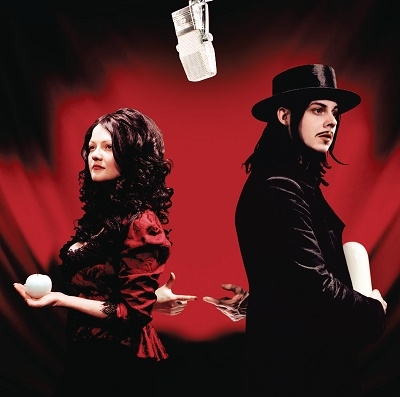2005年発売『Get Behind Me Satan』のアナログ盤。
ザ・ホワイト・ストライプスの到達点。これまでを凌駕する一枚に。
これまでのサウンドと違うアプローチが多く見られるが、それでも彼らならではアレンジ力が光る秀逸な作品に。今作でもグラミー賞、最優秀オルタナティヴ・ミュージック・アルバム賞を受賞。2005年リリース。
発売・販売元 提供資料(2021/12/17)
According to Jack White, Get Behind Me Satan deals with "characters and the ideal of truth," but in truth, the album is just as much about what people expect from the White Stripes and what they themselves want to deliver. Advance publicity for the album stated that it was written on piano, marimba, and acoustic guitar, suggesting that it was going to be a quiet retreat to the band's little room after the big sound, and bigger success, of Elephant. Then "Blue Orchid," Get Behind Me Satan's lead single, arrived. A devilish slice of disco-metal with heavily processed, nearly robotic riffs, the song was thrilling, but also oddly perfunctory; it felt almost like a caricature of their stripped-down but hard-hitting rock. As the opening track for Get Behind Me Satan, "Blue Orchid" is more than a little perverse, as though the White Stripes are giving their audience the required rock single before getting back to that little room, locking the door behind them, and doing whatever the hell they want. Even Jack White's work on the Cold Mountain soundtrack and Loretta Lynn's Van Lear Rose isn't adequate preparation for how far-flung this album is: Get Behind Me Satan is a weird, compelling collection that touches on several albums' worth of sounds, and its first four songs are so different from most of the White Stripes' previous music -- as well as from each other -- that, at first, they're downright disorienting. As if the red herring that is "Blue Orchid" isn't enough warning that Get Behind Me Satan is designed to defy expectations, "The Nurse"'s ironically perky marimbas and off-kilter stabs of drums and guitar -- not to mention lyrics like "the nurse should not be the one who puts salt in your wounds" -- make its domestic skulduggery one of the most perplexing and eerie songs the White Stripes have ever recorded (although Meg's brief cameo, "Passive Manipulation," which boasts the refrain "you need to know the difference between a father and a lover," rivals it). "My Doorbell," on the other hand, is almost ridiculously immediate and catchy, and with its skipping beat and brightly bashed pianos, surprisingly funky. Meanwhile, "Forever for Her (Is Over for Me)" turns cleverly structured wordplay and those fluttering marimbas into a summery, affecting ballad.
But despite Get Behind Me Satan's hairpin turns, its inspired imagery and complicated feelings about love hold it together. Though "the ideal of truth" sounds cut-and-dried, the album is filled with ambiguities; even its title, which shortens the biblical phrase "get thee behind me Satan," has a murky meaning -- is it support, or deliverance, from Lucifer that the Stripes are asking for? There are pleading rockers, like the alternately begging and accusatory "Red Rain," and defiant ballads, like "I'm Lonely (But I'm Not That Lonely Yet)," which has a stubborn undercurrent despite its archetypal, tear-in-my-beer country melody. Even Get Behind Me Satan's happiest-sounding song, the joyfully backwoods "Little Ghost," is haunted by loving someone who might not have been there in the first place. The ghostly presence of Rita Hayworth also plays a significant part on the album, on "White Moon" and the excellent "Take, Take, Take," a sharply drawn vignette about greed and celebrity: over the course of the song, the main character goes from just being happy to hanging out with his friends in a seedy bar to demanding a lock of hair from the screen siren. As eclectic as Get Behind Me Satan is, it isn't perfect: the energy dips a little in the middle, and it's notable that "Instinct Blues," one of the more traditionally Stripes-sounding songs, is also one of the least engaging. Though Jack and Meg still find fresh, arty reinterpretations of their classic inspirations, this time the results are exciting in a different way than their usual fare; and while the album was made in just two weeks, it takes awhile to unravel and appreciate. Get Behind Me Satan may confuse and to be continued...
Rovi
前作『Elephant』で2003年度のグラミー賞2部門を受賞したホワイト・ストライプス。彼らが旗印として掲げている赤と白のストライプが、ペパーミント・キャンディーからインスパイアを受けたもので、子供時代のイノセンスの象徴だっていうのは、よく知られるエピソードだ。常々その紅白のペパーミント・キャンディーってやつを舐めてみたいと思っていたが、この新作『Get Behind Me Satan』を聴いて、たっぷり味わったような気にさせられた。ここに並んだ13のロックンロール・スウィーツは、過去のストライプス・サウンドとはひと味違う。ジャック・ホワイトのエレクトリック・ギターは最小限に切り詰められて、その緊迫したブルース空間にこれまでにない自由度を与えているのは、ピアノとマリンバのパーカッシヴな響きだ。すべてがレコーディングを始めてから作られた新曲らしいが、曲の構成やミックスは大胆にして緻密。彼らのサウンドの根底にずっと流れていたオルタナティヴな精神が、ここでは一種の凄みをもって全開している。ここに満ちているのは、まるで殺人犯が獄中で美しい肖像画を描き上げたような異様な迫力だ。イノセンスという言葉の裏に隠された無邪気な破壊力をポップな色彩でシュガーコーティングした本作は、すべてのロックンロール常用者を虫歯にするだろう。ベックの新作『Guero』にジャックが参加したのが、本作へのプロローグと思えるくらいブランニューな傑作!
bounce (C)村尾 泰郎
タワーレコード(2005年06月号掲載 (P74))
前々作『White Blood Cells』は全米チャート最高61位、前作『Elephant』は初登場6位とセールス面を見てもひたすら上向きだし、ジャック・ホワイトは俳優に挑戦したり、グラミー2冠に輝いたロレッタ・リンの最新作『Van Lear Rose』でプロデューサー手腕を発揮。セレブ化を慎重に避けつつ着々と存在感を強めているホワイト・ストライプスだが、この5作目『Get Behind Me Satan』ではメジャー志向に傾くどころかさらに独自路線を邁進。デュオという枠やローファイなアプローチは表現を限定するものではなく、逆にその身軽さゆえ、無限に拡大できることを印象付けている。まず従来と違うのは、ピアノとマリンバとアコギで曲を作り、エレキの使用を限定した点だ。つまり反テクノロジー主義の極みというか、アコースティック&パーカッシヴな楽器主体で構築。各曲の仕上がりはシンプルながら、結果的にサウンドは飛躍的に多様化した。冒頭のシングル曲こそ前作の延長上にあるも、古典的ソウルやカントリー、レッド・ツェッペリンばりのロックを網羅し、ラストは場末感に満ちたピアノ弾き語り。ブルースやガレージといった言葉はどんどん無意味になる。そしてジャックが説くのは、亡霊からリタ・ヘイワースまでさまざまなキャラが彩る寓話風物語の数々。荘厳かと思えば猥雑で、告白し、訴え、糾弾し、嘆き、外向きに発散されるエモーションに圧倒されっぱなし。もうバンドとしての特異な佇まいなどを語る必要はない。予測不能で大胆不敵な音楽性と、恐るべきソングライティング力で評価されるべき一枚だ。
bounce (C)新谷 洋子
タワーレコード(2005年06月号掲載 (P74))



